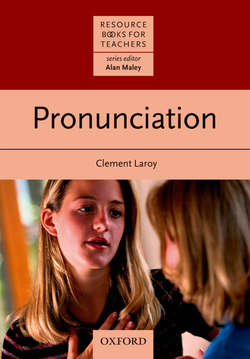Pronunciation

Реклама. ООО «ЛитРес», ИНН: 7719571260.
Оглавление
Clement Laroy. Pronunciation
Acknowledgements
The author and series editor
Foreword
Introduction
1 Tuning in to the language
1.1 Relaxing to learn
1.2 Put on your English shoes
1.3 What I can do in English
1.4 English in my life
1.5 My perception of English
1.6 Listen to the sound of English
1.7 Which face is English?
1.8 Playback
1.9 Make an English face
1.10 The ventriloquist
1.11 Finding my English/American voice
1.12 Imitate native speakers
1.13 Transmit your feeling of English
2 The beat and tune of English
2.1 Walking the rhythm
2.2 Slow down!
2.3 Surprise, surprise!
2.4 Pause!
2.5 Word stress
2.6 Feeling the rhythm
2.7 Speak rhythmically
2.8 Rhythm round
2.9 Talking hands
2.10 Sentence stress
2.11 Write your own song
2.12 Eat your words!
2.13 With the speed of summer lightning
2.14 Move to the tune of English
2.15 English babbling
2.16 Fireworks
2.17 Speak musically
2.18 The robot
2.19 Musical words
2.20 Speak Fallese
2.21 Whistle/hum the message
2.22 The moods of English
2.23 Show your attitude/meaning
2.24 Not the news
2.25 Tales
3 Approaching speech sounds
3.1 Re-invent English
3.2 The most English sounds
3.3 The easiest/most difficult sound(s)
3.4 Sounds and senses
3.5 Feeling the vowels
3.6 What sound can you make?
3.7 Sounds and movements
3.8 Sound metaphors and similes
3.9 The happiest sound
3.10 Draw the sound
3.11 Musical sounds
3.12 Echoes
3.13 Dy spk Nglsh?
3.14 Vowel/consonant songs
3.15 Mirror on the wall
3.16 Silent dictation
3.17 Whispers
3.18 Sound poetry
3.19 Playing with sounds
4 Correcting
4.1 Pronunciation weeding
4.2 Ear cleaning
4.3 That’s me speaking
4.4 Hold on to the sound
4.5 Recognize the words
4.6 Put them in a song
4.7 The sound orchestra
4.8 Try at least twice
4.9 Say what you can or what you can’t
4.10 Pronunciation game
4.11 William Wombat
Bibliography
Appendix
Index
Отрывок из книги
During a career spanning more than thirty years, Clement Laroy has taught in secondary schools in Belgium and in Africa, worked for educational television (Scientific and Technical English), worked in the Department of Applied Linguistics at the University of Brussels (Institut de Phonétique), taught young children, and trained staff in companies. Since 1975 he has been a teacher trainer. He is also a trainer at ISC St Louis College for Business Studies in Brussels. He has published several articles and is co-author with David Cranmer of Musical Openings: Using Music in the Language Classroom (Pilgrims-Longman, 1992) and has contributed to the The Standby Book, edited by Seth Lindstromberg (Cambridge University Press, 1997).
Alan Maley worked for The British Council from 1962 to 1988, serving as English Language Officer in Yugoslavia, Ghana, Italy, France, and China, and as Regional Representative in South India (Madras). From 1988 to 1993 he was Director-General of the Bell Educational Trust, Cambridge. From 1993 to 1998 he was Senior Fellow in the Department of English Language and Literature of the National University of Singapore. From 1998 to 2003 he was Director of the Graduate Programme at Assumption University, Bangkok. He is currently a freelance consultant. He has written Literature, in this series, Beyond Words, Sounds Interesting, Sounds Intriguing, Words, Variations on a Theme, and Drama Techniques in Language Learning (all with Alan Duff), The Mind’s Eye (with Françoise Grellet and Alan Duff), Learning to Listen and Poem into Poem (with Sandra Moulding), Short and Sweet, and The English Teacher’s Voice.
.....
Here, then, are some of the results of my observations.
Historical obstacles
.....